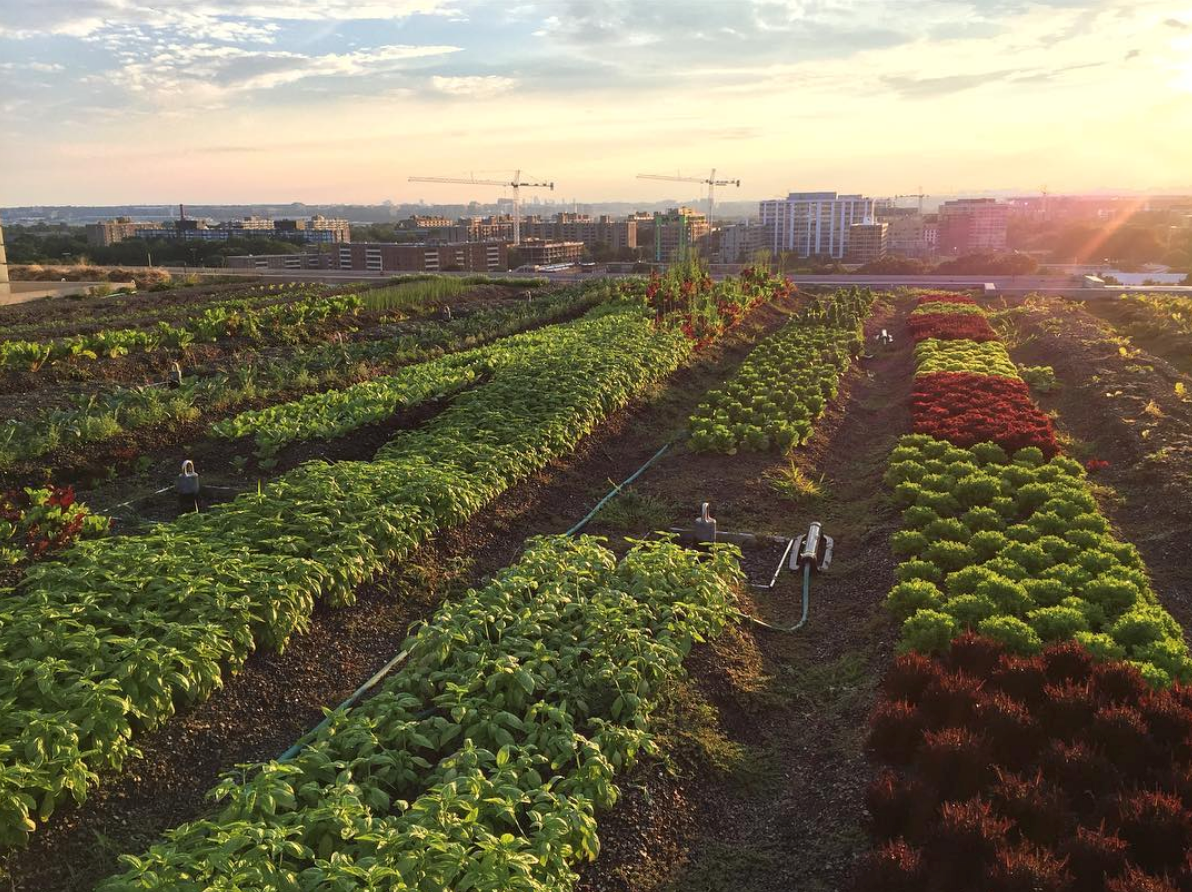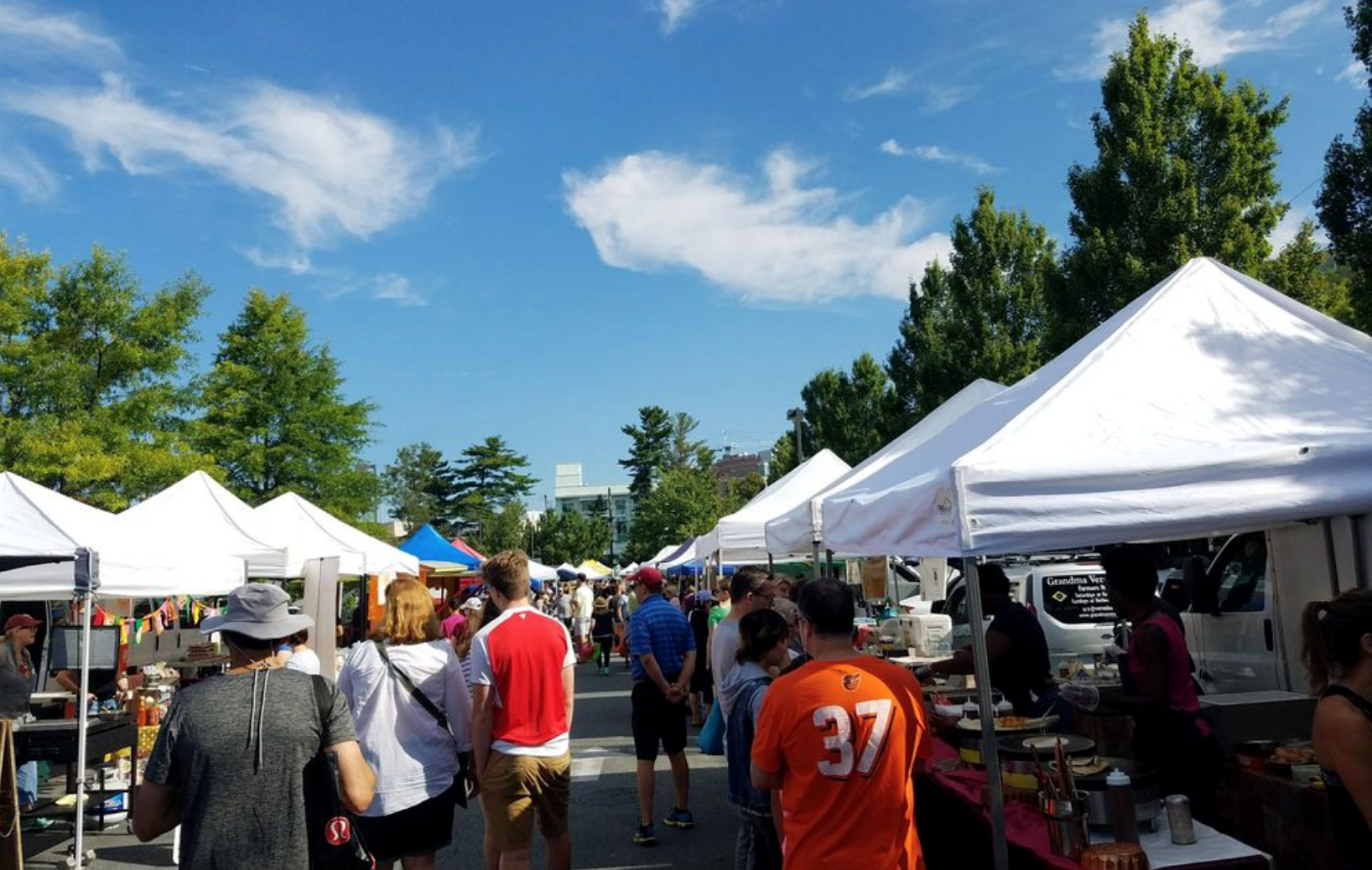By Bethesda Green Summer Fellow Rebecca Long
The local and sustainable food movement has finally begun to gain traction, and with it comes the question of “how can urban residents gain access to truly local and sustainably grown food sources?”. As urbanization increases, green space decreases, and many city residents feel as though they lose the opportunity to eat locally sourced food. Local food has become increasingly appealing because it is one of the best ways to practice sustainable eating habits. It is sustainable because it decreases transportation distances which decreases transportation costs and energy. Less distance traveled means the food also requires fewer chemical preservatives, and the food itself is healthier to eat. Most local food is grown at a smaller scale and organically. However, it is extremely important to recognize that the food you are eating is sustainably grown and managed, not just considered local because it was grown in close proximity to you.
Furthermore, the loss of space to cultivate because of increased urban development results in more mouths to feed and less potential to produce locally grown food to feed them. Here are a few ways urban residents can keep their eating local.
Roof Top Farms:
In the past, the substantial amount of buildings in cities has negatively impacted the environment through a phenomenon referred to as the “urban heat island effect”. The urban heat island effect occurs during warmer seasons when temperatures increase and the heat becomes trapped due to the sheer volume of tall buildings and reflective cement streets and sidewalks, making urban areas feel hotter. The added heat increases cooling efforts which in turn increases air conditioning usage and overall energy demands. Today, more and more city buildings are being used to improve urban sustainability and actually counteract the heat island effect through roof top farming. The majority of city roof tops are large, vacant spaces that go unused and are exposed to ample sunlight, making city rooftops an ideal place for urban farming. The reflective space on rooftops can be replaced by farms and gardens that help to absorb heat and cool the city, reversing the heat island effect and decreasing energy usage in urban areas. Rooftop farms also help provide sustainably and locally grown food to urban populations. Though there isn’t enough space on one rooftop to feed entire cities, roof top farms are a great way for small scale industries such as restaurants and cafes to acquire locally grown, quality food to their customers.

Up-top Acres DC Rooftop Location (Source: Up-Top Acres Instagram @uptopacres)
This innovative trend has made its way to the rooftops of Washington D.C., and even more locally to our home of Bethesda, Maryland, through the efforts of Up-Top Acres. The Bethesda roof top farm is centrally located atop the equinox building at the intersection of Elm St. and Woodmont Ave. Up-top acres also works to bring the community together by hosting events on their roof such as happy hours, viewing parties, and yoga classes.
Their rooftops provide food for local restaurants including Little Red Fox and Bethesda’s Jaleo, as well as to members in their CSA (Community Supported Agriculture) program, and to local Farmer’s Markets. Here is a link that provides information on all the locations where you can find Up-top Acres produce.
Roof top farms hold the potential to sustainably harvest food for city residents and restaurants that is grown as locally as right above their heads.
CSA/ Farmer’s Markets:

Bethesda Central Farmer’s Market (Source: https://www.yelp.com/biz_photos/bethesda-central-farm-market-bethesda-2?select=ygwhqLoF8cY5-HqH49o_3g )
CSA programs and farmer’s markets are two other great methods for urban residents to acquire trusted and locally grown food directly from farmers. CSA programs are arrangements between a buyer and a farmer. It is typically in the form of a membership or subscription that the individual purchases and in return they receive a box of seasonal produce from the farmer each week. CSA programs are great in connecting residents to local farms and extremely fresh food. On the other hand, the buyer doesn’t necessarily get to choose the type of produce they receive. The CSA is an excellent choice for individuals who may want to try new foods or prioritize the locality and freshness of their produce over the exact type of it, as well as for those who may not have the time or access to a farmer’s market. Here is a list of CSA programs serving the Bethesda Area.
Farmer’s markets require just a little more time and energy to acquire fresh produce, but they do offer more choice. Farmers bring their goods to the location of the market and sell it out of tents or tables and buyers visit the market to make their purchases. The produce offered at farmer’s markets is also almost always local and super fresh, and buyers can choose the food that appeals to them most. Most markets aren’t open every day and do have limited hours, but many offer pre-made food or baked goods as we well as other locally made items like organic soap or yarn. Bethesda hosts two great farmer’s markets: the Bethesda Central Farm Market and the Bethesda Farm Women’s Market, and you can find a full list of markets in the MD-DC-VA area here.
You can also find and purchase locally-grown food near you through 1000ecofarms (a member of the Be Green Hub incubator program).
DIY Gardens:
Lastly, there is the do it yourself method! Why not build your own garden and reap the delicious benefits of growing produce right outside your door? If you don’t have the land or space to grow, there are community gardens spread out through every city in the nation where you can bring your own seeds, plant, garden, and harvest any vegetation you like.
There may not be as much green space in cities to grow food but that doesn’t mean that urban residents are completely cut off from the opportunity to buy or grow locally harvested produce. Roof top gardens, CSA programs, Farmer’s Markets, and DIY/Community gardens provide city residents the ability to harvest, buy, dine out on, cook and get involved with locally and sustainably grown food sources.
Citations:
- LiveRoof Green Roofs Help Montgomery County Public Schools Set the Gold Standard For Green Schools. (2016, July 6). Retrieved July 17, 2018, from http://www.liveroof.com/liveroof-green-roofs-help-montgomery-county-public-schools-set-the-gold-standard-for-green-schools/
- The Farm Women’s Market. Accessed July 17, 2018, from http://farmwomensmarket.com/index.html
- Local and Regional Food Systems. Accessed July 17, 2018, from http://www.sustainabletable.org/254/local-regional-food-systems
- Elevate Your Eating. Accessed July 17, 2018, from https://uptopacres.com/index.html
- Community Supported Agriculture. Accessed July 17, 2018, from https://www.localharvest.org/csa/
- CSA’s Serving Bethesda. Accessed July 18, 2018, from https://www.localharvest.org/bethesda-md/csa





